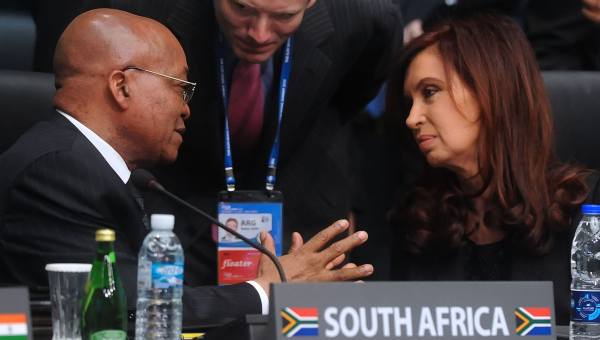Mobile communication blocked in SA parliament
Mobile communication blocked in SA parliament

It is not yet confirmed who was responsible for jamming mobile communication signals prior to the South African President's much-anticipated 2015 state-of-the-nation Address, held in parliament in Cape Town last night.
Before proceedings officially got underway, some sections of the Chamber – realising that communication was cut off – began chanting "bring back the signal" at Speaker Baleka Mbete.
From the outset, it would seem, technology was always going to play some part in President Jacob Zuma's SONA 2015.
Weeks before social networks were abuzz with responses to a request from the Presidency for suggestions on what to cover in the Address. According to media reports responses included pay back the money, education, load-shedding, community empowerment and Zuma's resignation.
ICT experts have described yesterday's proceedings as a 'sad day in the country's democracy'.
"The blocking of the mobile network signals and the use of police officers in the National Assembly were not only illegal but sure signs that the ANC is determined to hold power by force. Nobody who watched or listened to the SONA 2015 performance can believe that South Africa is a stable economy led by rational people determined to make the future better than the past," said ICT expert Adrian Schofield.
He also noted the statement that Telkom is to be government's 'lead agency' in rolling out the broadband network.
"This statement begs the question as to who in government profited from Telkom's higher share price, as it is likely that insiders knew that this extra business was coming Telkom's way. When will the ANC wake up to the fact that they only own a slice of Telkom and that, as a listed company, there are rules about how it can operate? Why is there not going to be a competitive tender process?
"Sadly, the Address gave little to comfort South Africans. The absolute crisis within Eskom is described as a "challenge" and the only remark about how the government intends to deal with it in the short to medium term that rang true was that demand will be managed – that means rolling blackouts will continue, unchecked."
Schofield adds that from an ICT perspective, representative associations must step up to the plate, combine resources and form an effective lobby to sustain a working partnership with government that achieves the right outcomes. "We have to transfer knowledge to the decision-makers and offer resources to implement the right decisions."
Africa Analysis MD Dobek Pater said that whilst the blocking of mobile network signals could be construed as an infringement of consumer rights to access information, it is important to remember that this was a specific event at a specific time and there are unlikely to be broader implications for the ICT market or sector.
He said that although it appeared to be a deliberate attempt to limit the dissemination of news and information, the country is not at the point where, as has been the case in some countries such as Afghanistan, telecommunications operators are forced by authorities to terminate transmission from base stations in order to block out opposition.
South Africa's media has reported extensively on events that unfolded in the country's Parliament.
In reaction to SONA 2015 Economic Freedom Fighters (EFF) leader Julius Malema, whose party MPs were physically removed from the Chamber, has been quoted as saying "we have seen that we are part of a police state where when people are unable to give political answers, political solutions to political problems, they resort to security apparatus and we've always said the ANC has sent South Africa into a security state, so today it was confirmed."
During last year's SONA, President Zuma made reference to the Square Kilometre Array project saying the country will complete the construction of more than 60 MeerKat dishes and begin with building the first 100 SKA dish antennas.
Zuma added, "We will expand, modernise and increase the affordability of information and communications infrastructure and electronic communication services, including broadband and digital broadcasting."
There was also reference made to the South Africa Connect broadband policy and strategy as a means to improve the living conditions of people and boost economic growth.
